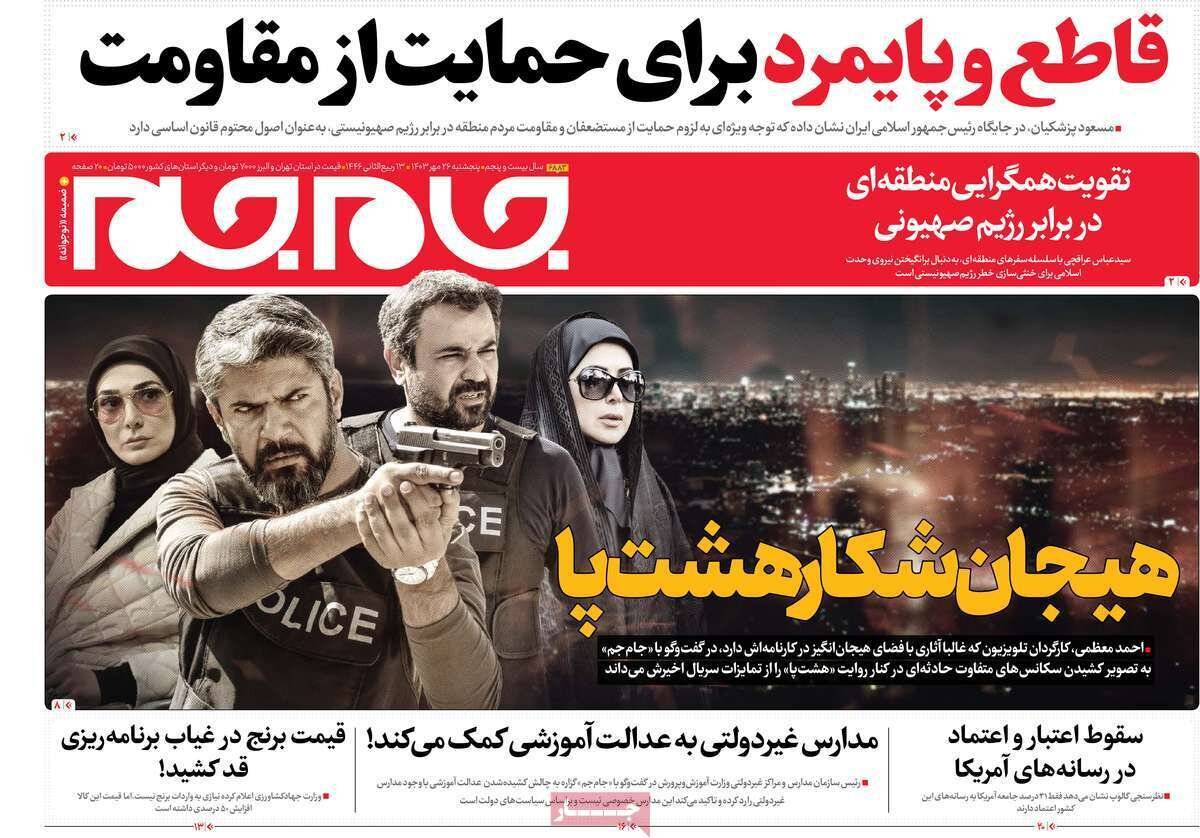Balancing diplomacy and military action

TEHRAN - In a note, Jam-e-Jam examined the objectives behind Araqchi's recent trips, stating: "Araqchi's visit to the countries of the region serves several purposes. If Israel decides to respond again, there is a risk of the conflict becoming regional.
The U.S. military bases are present in many of the surrounding countries, particularly in those along the southern Persian Gulf. During his trip, Araqchi emphasized that Iran does not seek to escalate the war or engage in conflict with the United States. He clarified that Iran's issue with the Zionist regime is both ideological and strategic."
He further urged regional countries, saying: "In the event of a regional war, we ask that you prevent any actions against us from being launched from the U.S. bases on your soil, in your skies, or in your territorial waters." On the other hand, Iran’s Foreign Minister stressed that their priority is first to secure a ceasefire, followed by finding a political solution to the crisis.
He also noted that the economies of most countries in the region are dependent on single commodities. In such a fragile situation, a crisis that closes the Straits of Hormuz and Bab al-Mandeb would bring hardship to everyone. The Israeli regime, it seems, is intent on dragging the entire region into chaos with itself.
Ham Mihan: Israel's war strategy?
In a commentary, Ham Mihan discussed Netanyahu’s decisive stance regarding Iran, stating: "Israeli media claim that a final decision has been made on Israel's response to Iran. Over the past few days, speculation around this has intensified. When talk of an Israeli response first emerged, the option of targeting Iran's nuclear facilities was floated. However, American officials have indicated that Israel is unlikely to strike these targets."
A potential sign that an Israeli operation is in the works is the satisfaction expressed by two of Netanyahu’s far-right ministers—Itamar Ben-Gvir, Minister of National Security, and Bezalel Smotrich, Minister of Finance. Their satisfaction is particularly notable as both are vocal advocates for continuing the war. News reports suggest that various factions across the Middle East are preparing to escalate the conflict further. Following the announcement that the THAAD defense system is being sent to Israel, military analysts have concluded that Tel Aviv is preparing to respond to Iran and is focused on addressing its defense vulnerabilities.
Donya-e-Eqtesad: Drones and Western hypocrisy
Donya-e-Eqtesad highlighted the West’s contradictory stance on the use of drones, noting: "When Western governments or their allies deploy drones, these are considered essential tools in the fight against terrorism and for national defense. But when countries like Iran, Russia, or China use drones, the West immediately portrays these actions as threats to world peace and violations of international law, leading to sanctions and pressure against those nations."
This double standard is particularly evident in West Asia, especially when it comes to Israel. The Zionist regime regularly uses drones to attack civilian areas and kill Palestinian civilians, yet there is no meaningful response from Western governments to these actions. This inconsistency not only exposes the West’s lack of moral transparency but also weakens the legitimacy of its claims regarding international law.
Sazandegi: The halt of the ‘Muscat process’ is inexplicable
In an analysis, Sazandegi addressed the suspension of indirect negotiations between Iran and the United States, quoting former diplomat Kourosh Ahmadi: "The pause in talks could impact Iran’s foreign policy. While Araqchi’s regional trips may have been useful, it remains unclear what strategy underpinned them. Engaging with some Arab countries, warning them against aiding attacks on Iran, and addressing bilateral issues are certainly positive steps. However, it’s doubtful that these talks will have a significant impact on the current regional crisis, including the ceasefire in Gaza, Lebanon, and Israel’s aggression against Iran."
Ahmadi further noted that, internationally, there is broad consensus that the United States is the only country capable of influencing Israel’s decisions. The minimum expectation for the Muscat process was that it would continue in the manner seen under the 13th government, rather than being halted altogether. One aim of Israel’s aggression and crimes may be to derail the Iranian government’s agenda. This should not stop the current government from pursuing its announced strategy and approach.

Leave a Comment